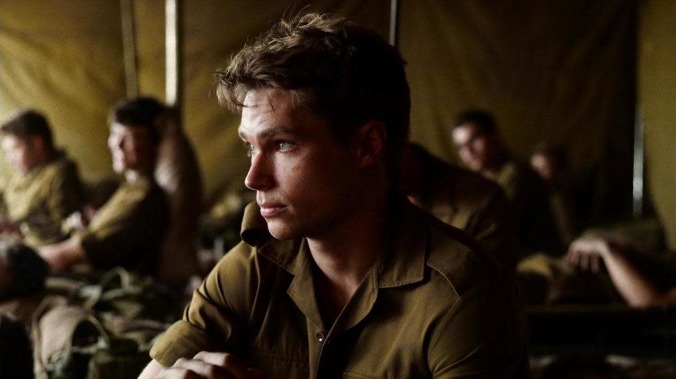

Note: The writer of this review watched Moffie on a digital screener from home. Before making the decision to see it—or any other film—in a movie theater, please consider the health risks involved. Here’s an interview on the matter with scientific experts.
Oliver Hermanus’ Moffie opens with an uneasy send-off dinner, followed soon after by a veritable descent into hell. The setting is South Africa in 1981, and 18-year-old Nicholas van der Swart (Kai Luke Brummer), like all other white boys over 16, is being conscripted for military service and a tour on the Angolan border, ostensibly to fend off communist terrorists. After a snaking train passage shot through with mounting terror, he soon finds himself in the darkness of a boot camp, under the thumb of Sergeant Brand (Hilton Pelser), an all-too-believable sadist who takes perverse pleasure in whipping the conscripts into shape. Beyond the usual horrors and humiliations of basic training, Nicholas also has to deal with the fact that, despite his last name (inherited from his stepfather), he is English among predominantly Afrikaans peers, and therefore has to fend off their taunts as well as Brand’s. Add to all this his hinted-at homosexuality, and Moffie stirs up, within its first half hour, a potent cocktail of violence and repression.
The title of Hermanus’ film, the Afrikaans word “moffie,” is an anti-gay slur that the subtitles translate as “faggot.” Alongside “commies” and “terrorists,” it is a word drilled into the boys as a mark of the enemy, and slung far more frequently than either. Early on, two conscripts are humiliated in full view of the camp for having been caught together, and though we don’t see what happens to them, we learn that they are sent to Ward 22, the military’s equivalent of an insane asylum. The dangers of same-sex desire being unaccountably high, Nicholas stays in line and gets by as best he can. But after a night of non-sexual intimacy with Stassen (Ryan de Villiers), a fellow squad member, the possibility of something more glimmers.
The film’s violent, rabidly homophobic boot camp environment it not exactly unfamiliar, and will no doubt bring to mind Stanley Kubrick’s Full Metal Jacket. But the particular setting, a uniquely charged microcosm of South Africa’s white minority, makes a difference. Adapted from an autobiographical novel by André Carl van der Merwe, Moffie devotes most of its runtime to drawing out the details of Nicholas’ experience, and thus trains its eye on the English-Afrikaans conflict that he feels most insistently. This is not to say that Hermanus entirely omits South Africa’s apartheid context—only that the film deliberately but fairly effectively narrows its focus, relegating explicit white-on-Black violence to a few key scenes. For Nicholas and most of his peers, ideology and even personal morality matter little next to survival.
Likely because of its autobiographical source, Moffie has a jagged rhythm that’s more attuned to sense-memory than to any sort of conventional narrative progression. Raucous passages of casual roughhousing and illicit drinking sit alongside training sequences set to classical music and opera (which recall Claire Denis’ Beau Travail, though this film is nowhere near as elliptical and poetic as that one). Meanwhile, scenes of abuse and violent bullying cut against the deadly dullness of a VHS instructional session. Apart from Nicholas, Stassen, and a rebellious recruit named Sachs (Matthew Vey), Hermanus doesn’t take many pains to distinguish between the recruits. But this mostly works in the film’s favor, leaving room for moments unattached from any larger trajectory. One of the film’s most memorable scenes knowingly toys with the homoerotic overtones of a volleyball game, before ending abruptly in a violent, out-of-left-field crisis that is never brought up again.
Hermanus’ touch is undeniably heavy, but though he frequently courts cliché, he often manages to push beyond it, such as during a midpoint flashback to Nicholas’ traumatic childhood experience at a public swimming pool, which reaches a genuinely harrowing place without being glibly “explanatory” of his situation. (It helps, too, that the script, co-written by Jack Sidey, is economical without being overdetermined.) Still, it’s probably never a good idea to hitch a pointedly irresolute finale to Charles Ives’ “The Unanswered Question,” and at its worst, Hermanus’ forceful direction can land with this sort of thudding literality. But befitting its harrowing subject of young men hammered into rigid conformity, Moffie leaves a lasting mark all the same.
3 Comments
Moffie… Mank… What’s next?What’s next I ask you?
Monk The Remank.
I knew that South Africa had its own nuclear weapons program at one time, but didn’t know that conscription started at 16.